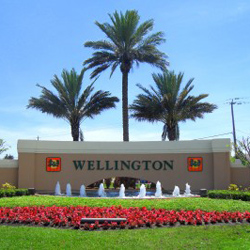The Village of Wellington has been recognized for its green practices, earning the 2014 Florida Water Environment Association’s Technology Innovation & Development Projects Biosolids Award.
Presented on Tuesday, April 8, the award celebrates Wellington’s innovative method of turning the waste from its wastewater treatment plant into a reusable product. The village took first place in the category.
Wellington Engineer Bill Riebe said the honor belongs to the staff at the facility, including Wastewater Treatment Plant Administrator Brian Gayoso.
“Brian Gayoso and his group of operators and maintenance folks have done a great job,” Riebe said. “They spent a lot of time thinking this thing through, making sure it would work. It’s a great honor.”
As a way to cut costs and be more environmentally proactive, Wellington installed a new system in 2013 to dehydrate and reuse biosolids — the nutrient-rich organic materials that are byproducts from treating sewage sludge. Federal regulations require municipalities to safely dispose of their biosolids.
Riebe explained that until the new equipment was installed, Wellington would use lime to stabilize the material and deactivate harmful bacteria before trucking it to farms to be spread on pastures or groves. The resulting “sludge” was considered “Class B” and is becoming outdated, he said.
“The problem is with new regulations, it’s hard to find farmers to take that kind of sludge anymore,” Riebe said. “They have to leave it there and can’t use the land for many years. Soon, there won’t be any place to put it. It also cost between $180,000 and $200,000 a year to haul it.”
The new method of processing the biosolids produces a material that Wellington can sell for public use.
“We dry it; we break down the solids, press water out of it and then put it into a dryer,” Riebe said. “The end product is granular. It’s Class AA sludge, the highest level you can achieve, and it’s suitable for public use. You can use it in fertilizer.”
Wellington had the equipment designed and manufactured, and it now sits at the village’s wastewater treatment plant. Not only does it produce a sustainable product, but it has cut down on Wellington’s costs.
“The cost is a little less now; we still have to pay for energy costs,” Riebe said. “But the important thing is we now have a product that is marketable. We can actually sell it.”
The product sells for about $32 a ton, netting Wellington approximately $24,000 a year, according to a staff report.
The process also creates reclaimed water, which Wellington uses throughout the village to irrigate plants and for other purposes.
“It’s a sustainability project to try and extend our water resources,” Riebe said. “We are able to reuse water that has already been consumed, and we try to use it as many times as we can. Then, with the biosolids, we are creating a product that is marketable.”
The changes have helped Wellington be more sustainable.
Councilman Matt Willhite told the Town-Crier Wednesday that he was glad to see Wellington continue its “green” practices.
“If we can be more sustainable on our own, it is better for future generations and for our community,” he said. “We know of a cheaper, easier way to do it, and it’s beneficial in helping our environment. There was a cost upfront, but this method will offset our costs and be better for the future.”
Riebe noted that Wellington isn’t the first municipality with such a facility, but it’s one of the first to have its own in-house.
“The county has a drying facility at the Solid Waste Authority site,” he said. “Other communities send their material there to be processed. Having our own gives us more flexibility. We can process whenever we need to, where the county facility is continuously processing and needs to be fed. It takes a lot of energy.”
The award commends Wellington for its innovation. “The water and wastewater industry is pretty conservative,” Riebe explained. “We don’t want to take chances with people’s health and safety, or with the environment. We use processes that are proven to work and proven to be safe.”
The village now serves as a model to other communities, which are looking toward Wellington as a pioneer in the technology.
“We’ve had several utilities contact us with questions and ask to tour our facilities,” Riebe said.
He added that the honor is a testament to village staff who do the day-to-day work.
“It’s a real testament to the operators, the guys who operate the plant every day, and all the design professionals who worked on the project,” Riebe said.








